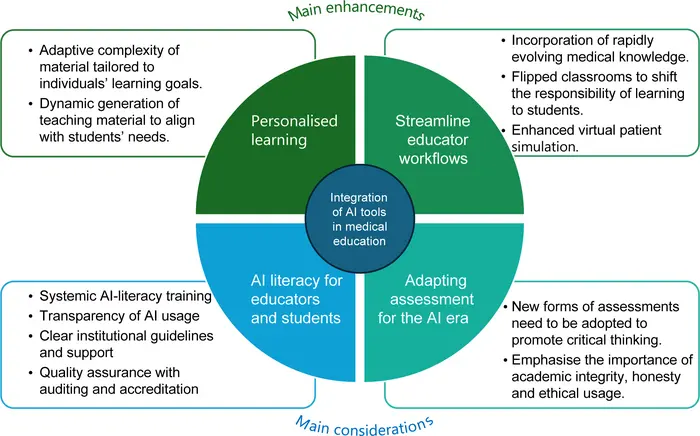The integration of artificial intelligence (AI) into medical education marks a pivotal shift in how knowledge is disseminated and absorbed in the teaching environment. The increasing prevalence of AI tools such as ChatGPT, Bard, and Deepseek heralds a new era where educational frameworks can be enhanced through technological advancements. Recently, a group of esteemed international medical educators published a groundbreaking guide titled “Artificial Intelligence in Medical Education: A Practical Guide for Educators.” This seminal work aims to equip educators with the necessary insights and strategies to effectively utilize these powerful tools, ensuring they complement rather than compromise traditional educational methodologies.
The impetus behind the guide arises from the exponential growth in the accessibility and application of generative AI technologies within academic settings. As students increasingly turn to these tools for learning purposes, the challenges faced by educators are also intensifying. How can they adapt their pedagogical strategies to not only incorporate these innovative tools but also safeguard the quality of education? The guide serves as a timely resource, distilling complex concepts into actionable insights for educators navigating the intersection of technology and pedagogy.
Among the many practical suggestions presented in the guide, one of the primary focuses is on utilizing AI to facilitate curriculum development. With the speed at which medical knowledge advances, staying current is no small feat. AI has the potential to provide real-time content updates, ensuring that educational materials reflect the latest advancements and evidence-based practices in medicine. This capability enhances the relevance of educational offerings and fosters an environment of continuous learning, which is crucial in a field as dynamic as healthcare.
Furthermore, the guide emphasizes the importance of developing interactive learning experiences. By leveraging AI technologies, educators can create virtual patient simulations that foster engagement and enhance comprehension. These immersive experiences enable students to apply their knowledge in a controlled environment, promoting critical thinking and clinical reasoning skills. Through gamification strategies, students can not only learn but also enjoy the learning process, ultimately leading to better retention of knowledge.
Designing assessments that effectively measure student comprehension while mitigating the misuse of AI tools is another pressing concern addressed in the guide. Educators are urged to create evaluation strategies that promote higher-order thinking, encouraging students to analyze, synthesize, and apply knowledge rather than simply regurgitating information. This requires a fundamentally reimagined approach to assessments, one that values creativity and problem-solving skills over rote memorization.
Ethical considerations form another significant aspect of the discourse within the guide. With AI’s growing influence, questions surrounding data bias, academic integrity, and privacy have become increasingly pertinent. The authors call for a critical examination of these issues, advocating for transparent practices and institutional policies that protect both educators and students. Ensuring academic honesty must remain paramount, as you implement AI solutions in educational contexts.
In the pursuit of effective AI integration in medical education, the guide also advocates for comprehensive training for educators. By fostering AI literacy among faculty members, institutions can empower educators to navigate this technological shift with confidence. Institutional support is crucial in mitigating feelings of overwhelm that may arise as educators grapple with the quick pace of change. Training programs must be designed to not only enhance educators’ technical skills but also to instill a deeper understanding of AI’s role in education.
The guide’s authors, including Prof. Olivia Monteiro and Prof. Nivritti Patil, emphasize that AI should not replace the human elements of teaching that are vital in developing professional judgment, empathy, and ethical awareness. Medical education is inherently relational; it necessitates mentorship, guidance, and the nuanced interactions between instructors and students that technology cannot replicate. AI should enhance these relationships, serving to enrich the learning experience rather than diminish it.
As universities globally seek to modernize their educational practices, this guide presents a framework that balances innovation with tradition. By providing clear, actionable steps for incorporating AI into curricula while safeguarding ethical standards, the guide serves as a beacon for educators looking to harness the full potential of educational technologies. In this evolving landscape, maintaining a focus on student well-being and educational integrity must remain at the forefront of any technological integration.
The discussions surrounding the integration of AI in medical education paint a picture of possibility marred by challenges. Institutions must engage in systemic evaluations of their educational frameworks to ensure that AI is utilized responsibly and effectively. Creating policies that govern AI’s application in educational contexts is essential to promote its safe and beneficial use, ultimately leading to improved educational outcomes.
In conclusion, the publication of “Artificial Intelligence in Medical Education: A Practical Guide for Educators” represents a significant contribution to the discourse on educational technology in medical training. It serves as a call to action for educators to embrace innovation while remaining vigilant about the ethical implications of their practices. As the medical education landscape continues to evolve alongside technological advancements, the guide provides the necessary tools and insights to navigate this uncharted territory effectively.
Through this thoughtful exploration, educators are reminded that the essence of teaching lies not in the tools they employ, but in the connections they forge with their students. It is within these crucial interactions that true learning occurs, and AI is merely another resource to facilitate rather than supplant human engagement.
—
Subject of Research: Integration of Artificial Intelligence in Medical Education
Article Title: Artificial Intelligence in Medical Education: A Practical Guide for Educators
News Publication Date: 2-Apr-2025
Web References: http://dx.doi.org/10.1002/mef2.70018
References: Details not provided.
Image Credits: Credit: The author Olivia Monteiro
Keywords: Artificial Intelligence, Medical Education, Curriculum Development, Virtual Simulations, Ethical Considerations, AI Literacy, Educational Technology, Teaching Strategies, Student Engagement, Assessment Design, Continuous Learning, Professional Judgment.




